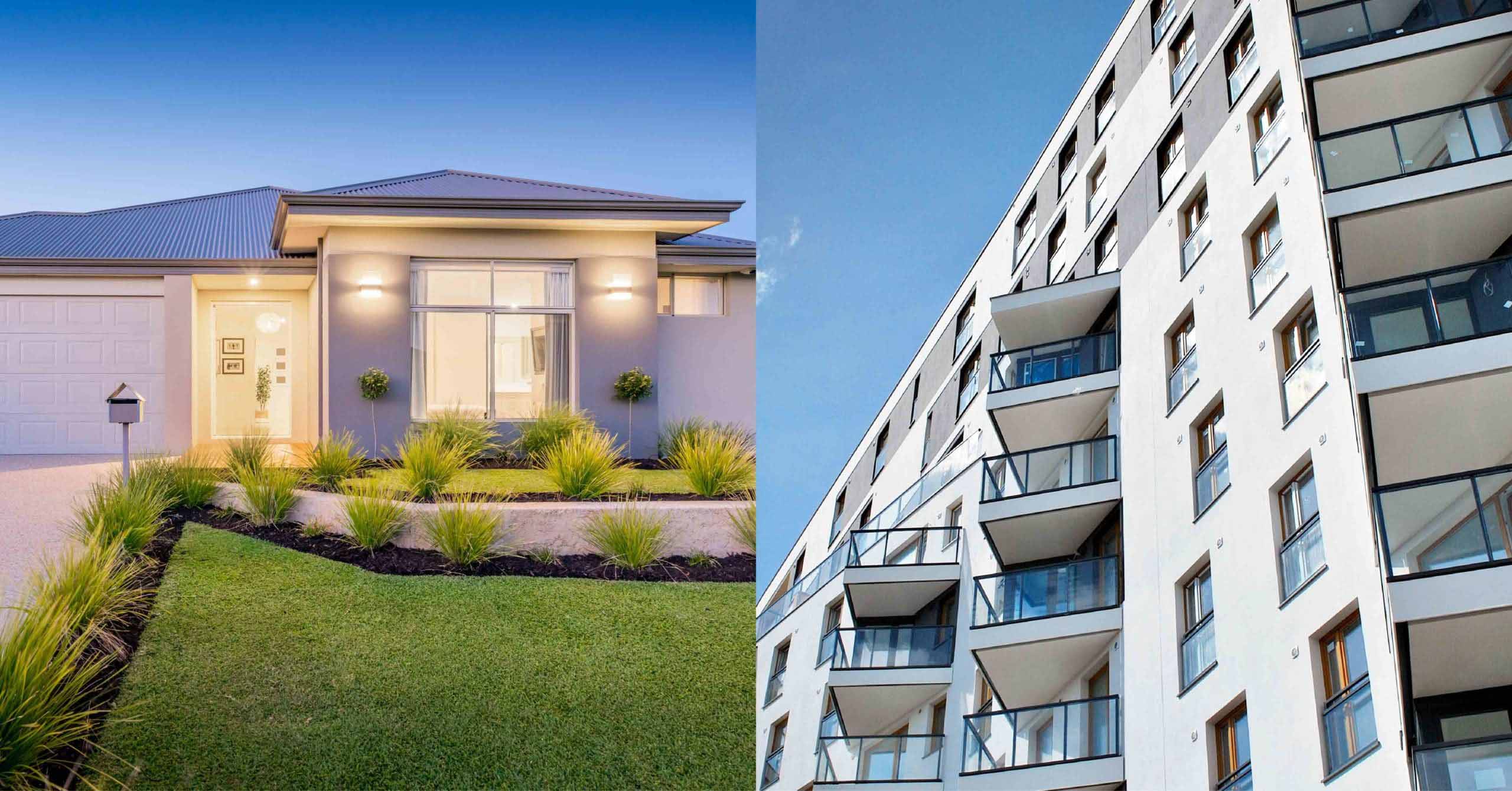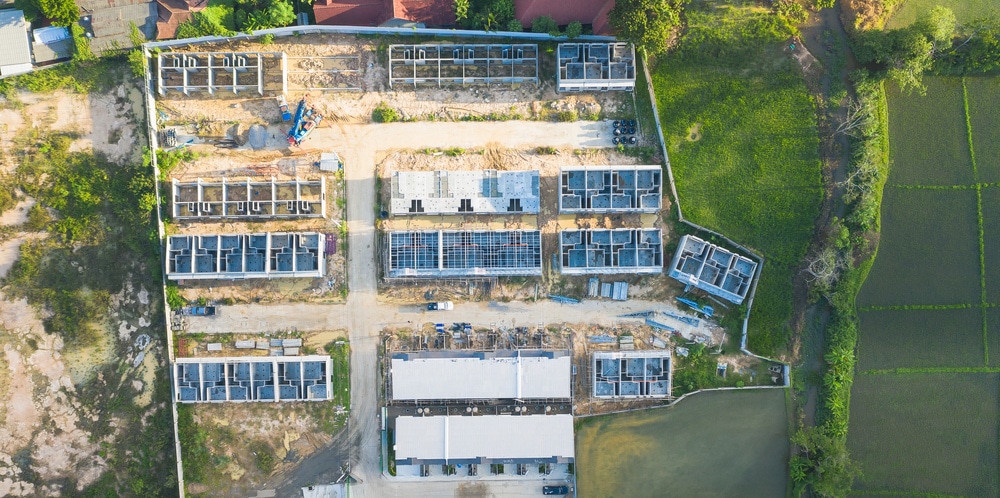
House Vs Apartment Investment – Which Is Better?
These days property comes in all shapes and sizes, giving property investors more options than ever before. The question on everyone’s lips when it comes to the house vs apartment investment equation, is how do you truly know which is better?
The answer to this question could quite easily be different for everyone based on your unique position as an investor and what you’re wanting to achieve when it comes to building your property portfolio.
Therefore, this becomes a topic around strategy and understanding the pros and cons of the house vs apartment investment debate.
HOUSE VS APARTMENT
Before we get into the nitty gritty of which is better – house vs apartment, let’s take a quick look at the universal buying laws that are key no matter what type of property you buy.
Ensuring you purchase a property that can sustain regular rent increases is crucial in generating good cash flow and passive income regardless of whether you’re buying a house or apartment for investment. This is at the crux of successful real estate investing!
But, what makes it possible for property investors to do this?
Before you’ve even invested in a property, you need to know that location is a key factor in how much rent you will be able to charge.
In one way, it’s good to think about it as a simple equation of proximity. The closer your property is to something that people want or need to live by, the better rents you will be able to charge, and raise.
This might be proximity to the CBD, the ocean, or a train station that gets you into the city in less than 10 minutes.
Whatever it is, there needs to be a drawcard that will keep bringing people to that area.
Buy a property in close proximity to that drawcard, and you will be able to charge good rent rates and raise rates at regular intervals.
Remember, it’s easy to change a property once you’ve bought it. New kitchen or bathroom, or new air-con. But it’s impossible to change location. Once you’ve bought a property you can’t decide the location is all wrong and pick up the bricks and move them. Location is forever, so get it right.
On top of this, you’ll also need to make sure you pick quality tenants and the right property manager – you can read more about this here.
PROS FOR INVESTING IN AN APARTMENT
When it comes to the house vs apartment investment discussion, generally apartments are an affordable option for those looking to get on the investment property ladder. Additionally, they can allow investors to get into more desirable areas that wouldn’t be possible if trying to purchase a house. That means you get all the added benefits of a prime location for a fraction of the price.
Quality apartments can also be great from a cash flow point of view. Generally, they have higher rental yields.
Depending on your budget and investing position, you could buy two apartments or units for the same price as a house resulting in a higher rental income.
Then there’s the added bonus of potentially less upkeep and maintenance. If you buy right, for very little extra in body corporate fees, all the common areas of the complex where your apartment is situated will be maintained and kept in great condition. This keeps it appealing for tenants with little extra work on your part.
CONS FOR INVESTING IN AN APARTMENT
Of course, as with anything, you’ll need to weigh up the pros from the cons.
When it comes to the house vs apartment investment argument, apartments do have some drawbacks.
Along with units and even townhouses, apartments lack land value which impedes capital growth. This means that because the land-size is a lot smaller you may not make the same amount in capital over the longer term as you would on a house. Factoring this into your overall investment strategy will be important to ensure you have enough equity over your buying phase to build your property portfolio.
Waiting for the market to grow is one way to create capital growth but many active investors like to fast-track their ability to create equity where they can. This could be considered a negative about owning an apartment because unlike a house which you can extensively renovate, there may be limits around the changes you can make depending on the rules laid out on the strata title – again limiting growth potential.
Strata or body corporate fees which were listed in the above pros list can also be a con if they’re too expensive. When developing a budget, you’ll need to ensure that these costs don’t eat away at all of your cash flow putting you in a negative position.
SUMMARY – PROS AND CONS OF BUYING AN APARTMENT
Pros
- Generally higher rental yield – good for cashflow
- Easier to hold – a strata manager is responsible for the upkeep of the building
- More affordable options available
Cons
- Lack of land value impedes capital growth
- Strata fees
- Limited renovation opportunities
- Some markets are oversupplied
- Banks can have stricter lending policies
PROS FOR INVESTING IN A HOUSE
An obvious pro when looking at the house vs apartment investment conversation is that with houses, you’ll enjoy higher capital growth. This is because land is scarce and it will always grow in value. But one thing that generally trumps over land is location.
If you have a beach front property in the middle of a high-end suburb, even if it has smaller land it will still value higher than somewhere that is on the outskirts of nowhere.
When it comes to real estate, regardless of whether it’s a house vs apartment investment, location is key. If you’re looking for great capital growth, the idea is to find good land in a great location.
Also, with land comes the ability to subdivide, which for an investor can be a very attractive option and a great way to grow an already good asset. And even if you don’t want to, or are unable to subdivide, as the sole owner you can add value in other ways such as renovate without the need to seek approval from strata management.
Another plus about owning a house is the type of tenants you may attract. With a bigger floor plan, more outdoor space and better privacy – you may decide that families with higher incomes wanting to live in a home, is the right target market for you.
CONS FOR INVESTING IN A HOUSE
When looking at house vs apartment investment pros and cons you will typically find that the cost for a house versus an apartment, unit or townhouse may be a lot more. On top of this, rental yield is usually a lot lower. Again, this is where it’s essential to understand your wider portfolio strategy and buy according to your longer term financial goals.
While any property will require safety cash buffers in case something goes wrong or market conditions such as interest rates change, there could be higher costs that need to be set aside for the maintenance of a house depending on the age and quality in which you purchase it.
SUMMARY – PROS AND CONS OF BUYING A HOUSE
Pros
- Opportunity for higher capital growth – depending on market conditions
- Strategic improvements e.g. renovations, subdivision, development
- Depreciation of the structure of houses
Cons
- Generally lower rental yield
- Higher maintenance costs
BUYING HOUSE VS TOWNHOUSE
Now it’s important to note that while this discussion is around the house vs apartment investment pros and cons list – townhouses should not be overlooked. In fact, for some investors, a townhouse can offer the best of both worlds.
They’re an affordable alternative for many investors, giving buyers the option to buy in sought after locations that are desirable among tenants. Townhouses are oftentimes bigger than apartments and are built across multiple levels.
In most cases, as with an apartment, you’ll still have a body corporate and have to follow similar rules.
According to an article published on Domain, townhouses remain a stable investment in Australia.
What about capital growth – townhouse vs house? As a general rule of thumb, again, houses trump because of the land value but as mentioned a few times already, this does depend on the area you buy in and the overall quality of the property.
WHAT CAN YOU AFFORD?
The first thing to work out is what you can afford. When it comes to the deciding factor of a house vs apartment investment, you’ll need to start by having a chat with a good lender or mortgage broker. This will play a big part in what type of property you can buy.
If you can afford an apartment in a great location but not a house, it is worth considering purchasing the apartment. Properties closer to a city centre will generally cost more because proximity to high-income employment is a key factor that affects values.
You also need to think about location. This requires figuring out the market. Accessibility to transport, shopping hubs and lifestyle attractions, should all play a factor in your decision.
Then there’s the opportunity to improve the value of the property. Houses have greater potential for renovations, rebuilds and extensions.
HOUSE OR APARTMENT FOR INVESTMENT – WHICH IS BETTER?
In deciding what’s better – a house vs apartment investment, the right property type for you will depend upon a number of factors such as your financial situation, how long you’ve been a property investor, the state of your current investment property portfolio, when you expect to retire, your capacity for risk and much, much more.
There are also other options available other than just house vs apartment. As mentioned, to balance affordability and size, you can always own a townhouse or even other property types such as duplexes and villas.
In reality, what works better – a house vs apartment investment? Either, or in between can work and there is no one size fits all solution.
The most important thing you can do as an investor is to put in the work and research so that you are confident when you buy. By making informed investment decisions you will build your wealth and improve your life.
If you want to learn how to do this and start investing, come to one of our free Property Investor Webinars happening this week.
Recent Articles
The Property Investment Basics That You Need To Know
Real estate has the potential to become your main vehicle for creating wealth, but only if you take the time to learn some crucial property investment basics to set you up for success as an investor.
Retirement Planning Tips For Property Investors
It’s the Australian dream – the clock ticks 65 (or earlier) and off you sail into the sunset of retirement to live out the rest of your years stress-free. Sadly, for some, this will remain nothing more than a dream with the drastic cost of living rising and no plan to cover the shortfall.
10 Ways To Save For A House Deposit [For Investors Or First Timers]
Saving for a house deposit to get onto the property investment ladder is tough. Especially with the cost of living drastically going up. After bills, rent/mortgage, groceries, petrol, insurance… there isn’t a whole lot left for saving. But that doesn’t mean it’s impossible! By adopting these 10 ways to save for a house deposit you’ll be ten steps closer to building out your portfolio and creating future wealth.
Learn Property Investment In 2022 – Where To Start!
With a commitment to learn property investment and all its ins and outs you’ll be able to grow a booming property portfolio, enjoy passive income streams and eventually create financial security for retirement. Here’s a list of how you can get started…
5 Questions To Ask Before Investing In A House
Some may stumble across a business opportunity, or perhaps investing in shares, but our go-to vehicle is real estate. Real estate is a long game that has the potential to provide generational legacy wealth, if done correctly. To set yourself apart from the 99% of investors who fail, you need to ask these 5 questions before investing in a house.
How To Protect Your Real Estate Assets For Long-Lasting Wealth
Protecting your real estate assets is perhaps more important than building them. Obviously we always hope for the best, but there are many things that can go wrong and when they do, you and your assets are at risk. Incorporating prevention measures into your investment strategy could be the difference between you continuing to build out your wealth or losing everything you own.
How Investors Can Use Equity Lock To Grow Their Portfolio
How to make money from subdividing land largely depends on how you choose to do it. One thing for sure though is that when done right, it can catapult your portfolio significantly in a very short time!
How To Make Money From Subdividing Land?
As an investor, there are many different strategies that you can employ to generate wealth, and a strategy that is great for instant equity gains is subdivision. But, while it sounds like an exciting project to take on, how do you actually make money from subdividing land?
The Money Management Skills You Need For Real Estate In 2022
Real estate is the perfect asset structure for wealth building, but it has to be done right – and that means having solid money management skills to back you as you make these major financial decisions. Some of these skills may seem obvious – like having a budget – but you’d be surprised how many young investors didn’t get to build this foundation of knowledge through their school or home life.






![10 Ways To Save For A House Deposit [For Investors Or First Timers]](https://positiverealestate.com.au/wp-content/uploads/2022/09/saving-for-a-deposit.jpeg)





